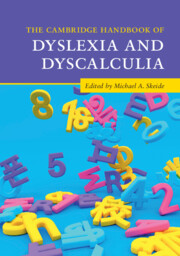Book contents
- The Cambridge Handbook of Dyslexia and Dyscalculia
- The Cambridge Handbook of Dyslexia and Dyscalculia
- Copyright page
- Contents
- Figures and Tables
- Contributors
- Acknowledgements
- General Introduction
- Part I Theoretical Frameworks and Computational Models
- 1 Theories of Dyslexia
- 2 Theories of Dyscalculia
- 3 Computational Models of Reading and Mathematical Difficulties
- Summary: Theoretical Frameworks and Computational Models
- Part II Cognitive Profiles and Behavioural Manifestations
- Part III Genetic and Environmental Influences
- Part IV Neurodevelopmental Foundations
- Part V Gender, Ethnicity, and Socioeconomic Background
- Part VI Cultural Unity and Diversity
- Part VII Early Prediction
- Part VIII Intervention and Compensation
- Part IX Best Practice – Diagnostics and Prevention
- Part X Best Practice – Schooling and Educational Policy
- General Summary
- References
- Index
- References
1 - Theories of Dyslexia
from Part I - Theoretical Frameworks and Computational Models
Published online by Cambridge University Press: 28 July 2022
- The Cambridge Handbook of Dyslexia and Dyscalculia
- The Cambridge Handbook of Dyslexia and Dyscalculia
- Copyright page
- Contents
- Figures and Tables
- Contributors
- Acknowledgements
- General Introduction
- Part I Theoretical Frameworks and Computational Models
- 1 Theories of Dyslexia
- 2 Theories of Dyscalculia
- 3 Computational Models of Reading and Mathematical Difficulties
- Summary: Theoretical Frameworks and Computational Models
- Part II Cognitive Profiles and Behavioural Manifestations
- Part III Genetic and Environmental Influences
- Part IV Neurodevelopmental Foundations
- Part V Gender, Ethnicity, and Socioeconomic Background
- Part VI Cultural Unity and Diversity
- Part VII Early Prediction
- Part VIII Intervention and Compensation
- Part IX Best Practice – Diagnostics and Prevention
- Part X Best Practice – Schooling and Educational Policy
- General Summary
- References
- Index
- References
Summary
Dyslexia is a disorder of development. Classically, a child has shown apparently typical language acquisition and cognitive development until faced with the task of learning to read. Suddenly the child struggles: ‘In spite of laborious and persistent training, he can only with difficulty spell out words of one syllable’ (Hinshelwood 1896, p. 1378). Why this apparently specific problem with reading and writing? One hundred years later, a child with dyslexia aged 9 years wrote ‘I have blond her, Blue eys and an infeckshos smill. Pealpie tell mum haw gorgus I am and is ent she looky to have me. But under the surface I live in a tumoyl. Words look like swigles and riting storys is a disaster area because of spellings’ (I have blond hair, blue eyes and an infectious smile. People tell Mum how gorgeous I am and isn’t she lucky to have me. But under the surface I live in a turmoil. Words look like squiggles and writing stories is a disaster area because of spellings) (author’s private notes).
- Type
- Chapter
- Information
- The Cambridge Handbook of Dyslexia and Dyscalculia , pp. 5 - 24Publisher: Cambridge University PressPrint publication year: 2022
References
Suggestions for Further Reading
- 4
- Cited by



